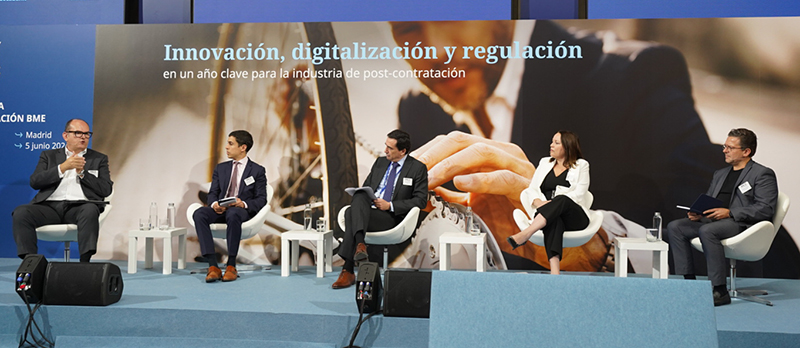
New technologies are the tip of the spear in post-trade services in order to improve process efficiency and reduce risks, letting people handle those tasks where they can provide more added value. This went one of the conclusions that stopped the III Conference of Post-contracting, organised some days ago by BME in the Palace of the Stock exchange.
Alexis Thompson, Head of Overall Securities Services, Head of Strategy & Business Development GTB in BBVA, highlighted the usefulness of the Artificial Intelligence (IA) to automate processes and contribute value. As stated by, in its company are «already making use of this new technology for part of the documentation; such as the executive summaries, in the processes of claim of taxes or in the certificates of ESG of our clients. We are amazed with the skills that has the IA to read the documents. We are still in evidence, but we have a lot of hope in it», ensured.
Programme of experimentation with the Bank of Spain
An opinion that shares with Aurora Cuadros, corporate director of Securities Services of Cecabank. Besides emphasise the role of the new technologies as an «engine of innovation for a bank guard and depositary» as they, launched another warning: «It is equal of significant the entrance of these new technologies as the management that we do theirs. From Cecabank embrace the new technologies and we experience what us contribute and the added value that us offer for our clients, everything with a lot of caution», underlined.
Precisely, the company went chosen together with Abanca to carry out programme of experimentation with technology blockchain with the Banco de España. Cuadros admitted that this line of inquiry «consists of simulate the cycle of life of a bond tokenizado, happening of the record in DLT until the settlement. We have done cases of use throughout the life of the bond in everything that process, together with the Banco de España. We prove on the market primal, in the secondary one, the conversion in one CBCD, etc. We have experienced with more than 30 cases of use», remarked.
The transition from T+2 to T+1
The technology has also helped in the change of the cycle of settlement that the United States has just implemented, from T+2 to T+1. An issue that from the European Authority of Securities and Markets (ESMA) are studying. Antonio Ocaña Álvarez, Senior Policy Officer of ESMA, admitted that they are preparing a report on the change, that they foresee is ready around the end of year. «We are analysing the effects that it can have the step to T+1 in Europe, to create a detailed road map of how and when you would be able to start to settle in T+1; and doing an analysis of the evolution to overall level of the settlement and how affects to the markets», moved forward.
So far, «the experience that are seeing in EE.UU. indicates an almost null depreciation of the efficiency in the settlement, therefore is enough heartening», explained. Although the there reunited experts coincided in which the change also will arrive at Europe, Ocaña Álvarez pointed out: «I am skeptic on the skills of the industry to organise and go all together towards T+1 if there is not an incitement stronger, are going to need a change of legislation», added.
Is of course Europe has differential factors that are owed take into account in the analysis (the celebrities Ñ of the Spanish management). But Thompson underlined: «There are months of hard work, involves a change of systems, of the processes and an automation. There is work behind, but it is possible to do it. So far, the change in EE.UU. it is being a success».
In this improvement of the efficiency the arrival of the Reform 3 in March 2025 also is going to give another boost. «I believe that it is a very well-chosen reform, entails some technical reductions and changes in the system registered Spanish, as the disappearance of the obligation of the PTI», Valentine Cerdán concluded, Market and Operation manager Special of CaixaBank.

